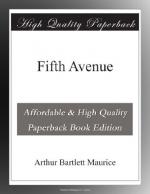CHAPTER XIX
Mine Host on the Avenue
Mine Host on the Avenue—A Gentleman of
Brussels—Poulard’s—Some
Old
New York Hotels—High Prices of 1836—The
American—The
Metropolitan—Holt’s—The
Brevoort and the Steamship
Captains—Delmonico’s—Famous
Menus—The Glory of the Fifth Avenue—The
Logerot—A Bohemian Chop-house—The
Great Mince Pie Contest—About
Madison Square—Lost Youth.
Is there anything that civilized man recalls more poignantly than the menus of yesterday? Of the Brussels of the winter of 1917, the last winter that the Americans of the Commission for Relief were allowed to remain, I have many vivid memories. One of them is of a crowd gathered before a shop-window in the Rue de Namur, a street that winds down from the circle of boulevards to the Place Royale. Within, the object of hungry curiosity, a fowl, adorned by a placard informing that the price is forty-four francs. Conspicuous in the crowd, his face pressed against the glass of the etalage, a little old gentleman. The bowl of municipal soup and the loaf of bread are all that he has to look forward to as the day’s sustenance. But as he gazes his mouth waters quiveringly, and for the moment the grey-green uniforms of the invaders that are all about him, and the hated flag that is flying over the Palais de Justice are forgotten. Soon he will go home and sit down and write a letter to La Belgique, in which he will recall the happier days, and tell of how one once was able to dine at the Taverne Royale for the sum of two francs, fifty, or three francs, fifty, enumerating carefully and lovingly the various courses. His letter, and others of similar nature and inspiration, were the only genuine letters that the occupying military authorities allowed to appear in the Belgian press.
But a world tragedy was not needed to invest with romance the menus of yesterday. A memory of youth is the rock of Mont St. Michel on the French coast. The name suggests a towering, isolated height in the ocean, close to the mouth of the river dividing Normandy from Brittany, surrounded at high tide by lashing waves, and at low tide by a muddy morass, save where a causeway joins it to the mainland. The monks of St. Michel sent ships to help convey the armies of William to Hastings, and when the yoke of the Normans on England was young two sons of the Conqueror waged battle here, and Henry besieged Robert or Robert besieged Henry. When Philip Augustus burned it and it was the only Norman fortress that withstood Henry the Fifth, and many years later, in Maupassant’s “Notre Coeur,” a certain Madame de Burne entered a room of one of its hotels and there blew out a candle. But above all I recall, and ninety-five out of every hundred others who have visited the rock recall, the breakfast that was once renowned throughout Europe—a breakfast at two francs, fifty, brought to perfection for the reason that it was always the same, the shrimps, the cutlets, the chicken, and the amazing omelette, which the portly Madame Poulard prepared in full view, tossing it like a flapjack, to a chorus of delighted “Ahs!”




